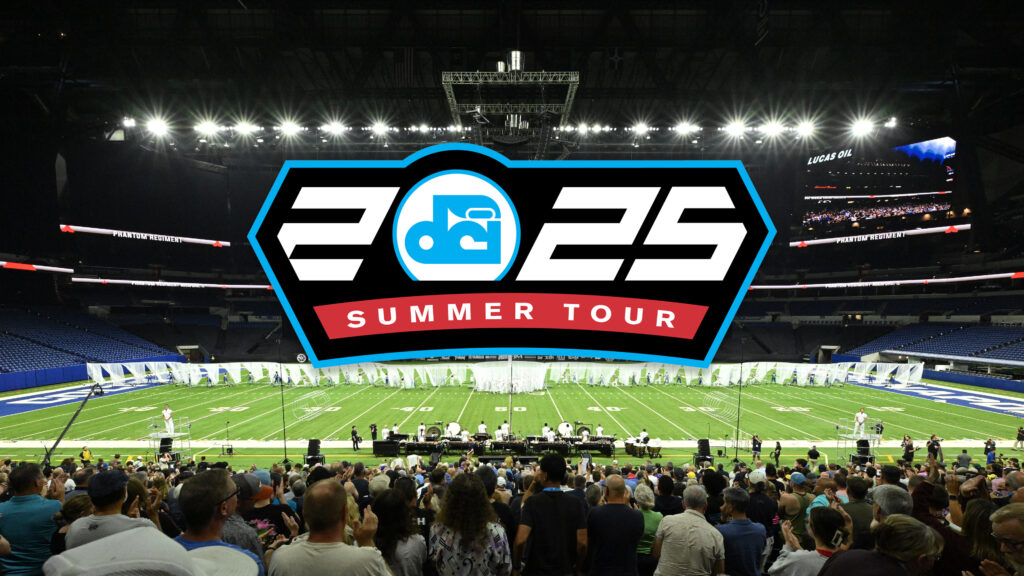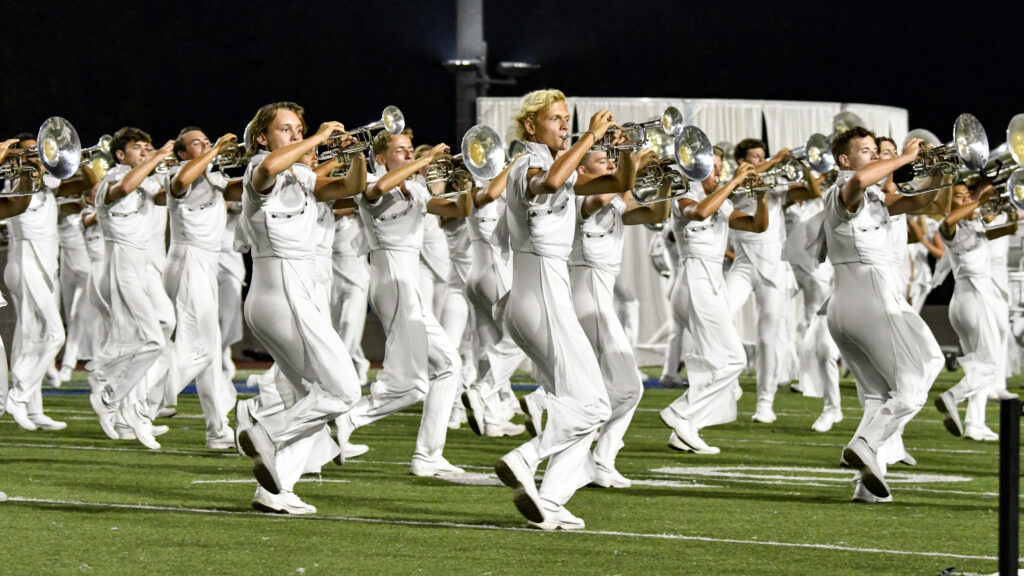Editor’s note: This article originally ran in January, but we’re rerunning it to coincide with the airing of the DCI broadcast on PBS, which begins airing this weekend.

To people who aren’t yet drum corps fans, or are new fans, Steve Rondinaro is “Reliable Rondo,” the face of DCI on the annual television broadcast. To those within the activity, he is the person who, perhaps more than anyone else, helps us explain the joy and wonder of drum corps to the general public. Steve agreed to share his thoughts and memories of his life in drum corps. The following are Steve’s own words.
Steve Rondinaro: My drum corps history is probably a strange one by today’s standards. I was lucky to start off as a charter member of a brand new drum corps in 1964, in my tiny hometown of Watkins Glen, N.Y. I was 9 when the Squires started. We were quite green and pretty bad, as you might imagine. We began as a parade corps in 1965, and I never stood taller than when we marched down Watkins Glen’s Franklin Street that Memorial Day, dressed in our white shirts, black pants, red ascots, and black berets with our single-valve bugles.
We hit the field in the late 1960s and were dreadful. We went from next-to-last to dead last at the New York American Legion Championships. Many of us will never forget our score of 20.33 and some guy in the stands yelling, “Get ’em off the field.” Our board then pulled us together, made some instructional changes, invested in some new instruments, and some magical changes began transpiring in little Watkins Glen. We started becoming a force in Class A competition, and began knocking on the door of some of New York’s biggest corps.
We won a Class A finalist spot at the 1972 World Open on our one-week tour. It seemed like the whole town and county came out to welcome us when we came rolling back into town on our yellow school buses. We did a concert at the town park that night … the conquering heroes playing their hearts out. (I had a gritty baritone solo that I blared out for all I was worth that evening. Coincidentally or not, I was in the hospital the next morning for an emergency appendectomy.) We went on in the mid-1970s to win Class A at the World Open, Class A at the US Open, and Class A at the American International.
I never had a better or more exciting time marching drum corps. The competition was intense and the results intensely gratifying. We also became New York’s dominant junior corps, running off a string of state championships. From dead last to the best was a wonderful feeling of accomplishment for those of us who had been there from the beginning. (Mind you, this was a town of 2,700 people in a rural, relatively impoverished county of 14,000.) Along the way, I was doing some strange things that would take my drum corps career in other directions.
I had started at the local radio station jocking tunes when I was 15. I also launched a weekly “Squires Report” radio program in addition to writing weekly updates for the local newspaper. I would call in reports from the road when we traveled on weekends and when we took our first “marathon” two-week tour. This new DCI thing, with all of the big corps, was coming to Ithaca, N.Y., in 1974, for the World Championships.
It was just up the road, so we gave it a try and came in 24th. That was a pretty big deal, but none of us really realized how big, or just what it meant, just then. We had some management changes in the off-season. A real adult named Bill Wickham ended up sharing director and manager duties with myself. I was still a marching member and still in college full-time, but I ended up taking care of our competitive scheduling, among other things. So I became our “DCI guy,” etc.
What an education! The 1975 DCI World Championship in Philadelphia saw us in a nip-and-tuck battle with the legendary Casper Troopers for the 12th place slot. The little Squires! We came up just .6 short, but that was a pretty amazing day and night. The Squires would be a force for the next several years, before the realities of our small town budget situation would catch up with us.
It was during this time that I really began working with (DCI public relations people) Don Whiteley and Doris Wentland. I knew a bit about the media and they knew the value of good PR for DCI and the individual corps. Whiteley was pretty amazing, and when he figured out I had at least half a brain, he put me to work “helping the cause.” I had earned an on-air reporting internship at the NBC TV affiliate in Rochester, N.Y., my senior year of college in 1976 and worked there full-time after graduation. Don needed a corps person to help with a first-time telecast of the DCI East Regional on the local PBS stations, with a weather person from Philadelphia.
He asked me to do it on pretty short notice. I was honored … and I was on tour running the Squires at that point, so the prospect of a warm shower and a decent meal was appealing, too. The next year Don said they needed help with a local telecast of the DCI Canada in Hamilton. “Sure,” I said. One could get pretty fond of warm showers, decent meals, and a bona fide hotel room on a spartan tour. I worked cheap, but it was great fun.
I also had the chance to forge a wonderful relationship with two of my favorite people in drum corps, Alan and Trudy Denton, the contest coordinators. I also did my first TV news live shot, courtesy of Don, at the 1978 DCI World Championship in Denver. The sponsoring TV station had sent a live microwave truck out to Mile High Stadium to do a shot Saturday night, but they did not send a reporter. By then I had a couple years of full-time TV news reporting and anchoring under my belt in Rochester, N.Y. But remember, these live trucks were new technology that hadn’t yet arrived in Rochester.
This was a pretty big deal and I know Don personally had a lot invested in the TV sponsorship. As best, I can remember it came off OK. I had a new notch on my r?©sum?© and Denver knew a bit more about DCI. I realize in retrospect that Don was gaining growing confidence in my abilities and trusted “the kid from Watkins Glen” with some pretty important duties. He even sent me on the road one winter to write part of the DCI yearbook.
I made visits to the Garfield Cadets, Crossmen, Seneca Optimists, and 27th Lancers. I had the opportunity to eat “Canadian” Chinese food with the Seneca Optimists’ Al Tierney and I also ate 27th Lancers’ Patsy Bonfiglio’s homemade spaghetti! Never in my wildest dreams did I even entertain a notion of doing the “big show” on PBS. I was still in awe of the big corps, their big-time staffs, and big-time directors. Try as we might, it was apparent that the Squires were not going to get there.
Heck, they had a big name like “Matchgame” host Gene Rayburn and people like Santa Clara Vanguard drillwriter Pete Emmons doing the live national telecast. But Don felt it could be better … and he was the guy who had helped make it happen in the first place. In the summer of 1979, Don again called on the “kid from Watkins Glen.” I was barely 24 when I co-hosted that first telecast … five-plus hours live from the middle of the stands under hot TV lights in that blast furnace known as Birmingham, Ala.
I was cast as the “drum corps expert,” and I guess I did OK. The rest, as they say, is DCI history of 25 years now. I realize in hindsight what a huge difference was made by Don’s confidence in me. In the fall of 1979, I left a secure, fairly cushy job in Rochester for the unknown of a reporting job at the NBC station in Miami. That was a jump from the 72nd largest market to the 15th largest. Within six months, I was coanchoring the 6 p.m. news. Since then, I’ve been under fire in Beirut, Lebanon, reported from London, covered the Mariel boatlift, been in the middle of two riots, anchored countless live space shuttle launches and landings, covered national political conventions, and reported from Washington.
I’ve met and interviewed United States presidents and most of the heroes of my youth. (And of course, there was the Florida Wave chapter, thanks too to Don Whiteley, who talked me into taking over a troubled Florida Vanguard operation.) [Editor’s note: Steve also brought that corps up to a 13th place finish at the DCI World Championships.] So, there was no magic drum corps moment for me, but there was one galvanizing influence — Don Whiteley. The telecast has changed direction many times, and so too has my role with it. I consider the friendships I’ve forged with Bill Cook, Michael Cesario, Tom Blair and Dennis Delucia as a result to be the highpoints. It’s pretty humbling to have today’s corps kids saying “I grew up watching you with the corps on TV.”
Michael Boo has been involved with drum and bugle corps since 1975, when he marched his first of three seasons with the Cavaliers.
He has a bachelor’s degree in music education and a masters degree in music theory and composition.
He has written about the drum corps activity for over a quarter century for publications such as Drum Corps World, and presently is involved in a variety of projects for Drum Corps International, including souvenir program books, CD liner notes, DCI Update and Web articles, and other endeavors. Michael currently writes music for a variety of idioms, is a church handbell and vocal choir director, an assistant director of a community band, and a licensed Realtor in the state of Indiana. His other writing projects are for numerous publications, and he has published an honors-winning book on the history of figure skating. His hobbies include TaeKwonDo and hiking the Indiana Dunes. But more than anything, Michael is proud to love drum corps and to be a part of the activity in some small way, chronicling various facets of each season for the enjoyment of others.





